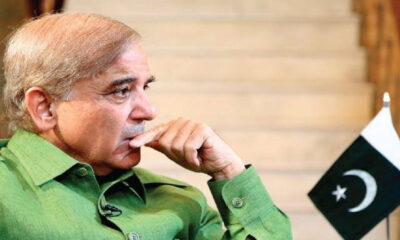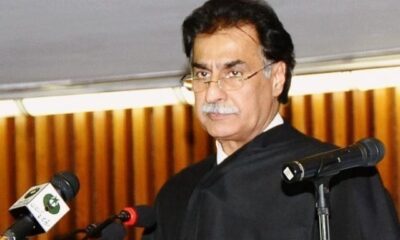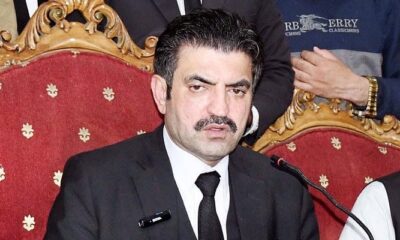- Aleema says she does not see justice being done in cipher trial.
- Says cubicles had been made in Adiala jail’s courtroom.
- Imran Khan indicted in cipher case for the second time.
ISLAMABAD: Former Pakistan Tehreek-e-Insaf (PTI) chairman Imran Khan’s sister, Aleema Khan, has expressed fear that her brother might get the death penalty in the cipher case, The News reported Thursday.
Speaking to reporters outside Adiala jail, where the former PTI chief is incarcerated in the cipher case, Aleema cast doubts over the ex-prime minister’s jail trial saying she did not see justice being done..
Khan was indicted by the special court established under the Official Secrets Act 2023 in the cipher case a day earlier. However, he has pleaded not guilty to their involvement in the offence related to the alleged misuse of diplomatic cable for political purposes.
Speaking about her brother’s cipher trial in Adiala jail, Aleema said that cubicles had been made in the courtroom, and she couldn’t comprehend what fear had caused this state of affairs.
Khan’s sister said her entire family was inside and the courtroom was locked from outside, adding that they were chased as soon as they left their house and threatened that they would be jailed.
“We have no fear, but there can be no fair trial without the media,” she said, adding that the media persons were not being allowed to attend the trial, which must be linked to some motive.
“It seems that we are not in our country but in some another country. It is very sad to see what is happening to us in our own country,” she added.
Imran expresses ‘no-confidence’ in IHC CJ
The former prime minister on Wednesday filed an application seeking recusal of Islamabad High Court (IHC) Chief Justice Aamer Farooq from all the benches hearing cases against him, according to The News.
Khan moved the application to the IHC, expressing a lack of confidence in Justice Farooq.
The application stated that Justice Farooq, since assuming charge as IHC CJ, had given the impression of a “one-man high court” and had included himself in every single and division bench hearing case related to Khan, apart from his intra-court appeals.
It said CJ Farooq had heard 120 applications from the former PTI chairman, alleging that the Toshakhana trial against Khan was conducted against the law, because of the IHC chief justice.
It added that CJ Farooq also heard a case related to the number of dependants of Khan in the election nomination papers. It stated that after the applicant raised objections to the single bench hearing the matter, a three-member bench was constituted, which through a majority decision dismissed the case against the former prime minister.
The application read that CJ Farooq not only removed the majority decision from the court’s website but also issued a press release. It maintained that the applicant had lost trust in the IHC CJ and did not expect justice from him; therefore, he should recuse himself from all the cases related to Khan.
What is ciphergate?
The controversy first emerged on March 27, 2022, when Khan — less than a month before his ouster in April 2022 — while addressing a public rally waved a letter before the crowd, claiming that it was a cipher from a foreign nation that had conspired with his political rivals to have PTI government overthrown.
He did not reveal the contents of the letter nor did he mention the name of the nation it came from. But a few days later, he accused the United States of conspiring against him and alleged that Assistant Secretary of State for South and Central Asia Affairs Donald Lu had sought his removal.
The cipher was about former Pakistan ambassador to the US Majeed’s meeting with Lu.
The former prime minister, claiming that he was reading contents from the cipher, said that “all will be forgiven for Pakistan if Imran Khan is removed from power”.
Then on March 31, the National Security Committee (NSC) took up the matter and decided to issue a “strong demarche” to the US for its “blatant interference in the internal affairs of Pakistan”.
Later, after his removal, then-prime minister Shehbaz Sharif convened a meeting of the NSC, which came to the conclusion that it had found no evidence of a foreign conspiracy in the cable.
In the two audio leaks that took the internet by storm and shocked the public after these events, the former prime minister, then-federal minister Asad Umar, and then-principle secretary Azam could allegedly be heard discussing the US cipher and how to use it to their advantage.
On September 30, the federal cabinet took notice of the matter and constituted a committee to probe the contents of the audio leaks.
In October, the cabinet gave the green signal to initiate action against the former prime minister and handed over the case to the FIA.
Once FIA was given the task to probe the matter, it summoned Khan, Umar, and other leaders of the party, but the PTI chief challenged the summons and secured a stay order from the court.
The Lahore High Court (LHC), in July this year, recalled the stay order against the call-up notice to Khan by the FIA.


 Business6 hours ago
Business6 hours ago
 Latest News7 hours ago
Latest News7 hours ago
 Latest News6 hours ago
Latest News6 hours ago
 Latest News7 hours ago
Latest News7 hours ago
 Latest News7 hours ago
Latest News7 hours ago
 Latest News7 hours ago
Latest News7 hours ago
 Latest News7 hours ago
Latest News7 hours ago
 Latest News7 hours ago
Latest News7 hours ago




















